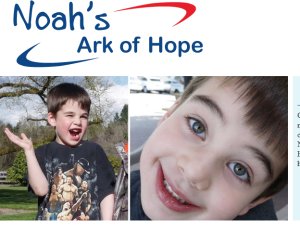Family Of Child Killed In Sandy Hook Shootings Shuts Down Scam Website

This is a grab of NoahPozner.org, the REAL site set up by the victim’s family.
“These scammers… are taking away from families and the spirits of dead kids,” the uncle of shooting victim Noah Pozner tells the AP [via NY Daily News].
After another family member received an e-mail from a site using Noah’s name and claiming to seek donations for the funeral, the boy’s aunt attempted to e-mail the person who registered the URL.
The operator of the site, which asked for money to be sent to an address in The Bronx, replied that the intention of the site was “to somehow honor Noah and help promote a safer gun culture. I had no ill intentions I assure you.”
When CNN’s Anderson Cooper sent reporters to the Bronx address, a woman there claimed that she was being set up and that she had returned the $300 she’d received.
The domain name for the scam is now in the family’s hands. The correct URL for the family’s site is NoahPozner.org.
“I’m going to do everything I can to protect [other families] and get the word out,” says Pozner’s uncle.
Again, here are tips to avoid being scammed by any questionable charity:
Don’t be shy about asking who wants your money. If you’re solicited for a donation, ask if the caller is a paid fundraiser, who they work for, and the percentage of your donation that will go to the charity and to the fundraiser. If you don’t get a clear answer — or if you don’t like the answer you get — consider donating to a different organization.
Call the charity. Find out if the organization is aware of the solicitation and has authorized the use of its name. If not, you may be dealing with a scam artist.
Ask for written information about the charity. This includes its full name, address, and telephone number.
Contact the office that regulates charitable organizations and charitable solicitations in your state, The National Association of State Charity Officials has contact information for regulators in each state available on its website.
Your state office also can verify how much of your donation goes to the charity, and how much goes to fundraising and management expenses.
You also can check out charities with the Better Business Bureau’s Wise Giving Alliance and GuideStar.
Trust your gut and check your records.
Callers may try to trick you by thanking you for a pledge you didn’t make. If you don’t remember making the donation or don’t have a record of your pledge, resist the pressure to give.
Be wary of charities that spring up overnight.
This is especially true after natural disasters. They may make a compelling case for your money, but as a practical matter, they probably don’t have the infrastructure to get your donation to the affected area or people.
Watch out for similar sounding names.
Some phony charities use names that closely resemble those of respected, legitimate organizations. If you notice a small difference from the name of the charity you intend to deal with, call the organization you know to check it out.
Be wary of charities eager to collect cash.
If they say they are sending a courier or offering overnight delivery service to collect your donation immediately, you have to wonder whether the charity is legitimate.
Know the difference between “tax exempt” and “tax deductible.”
Tax exempt means the organization doesn’t have to pay taxes. Tax deductible means you can deduct your contribution on your federal income tax return.
Do not send or give cash donations.
Cash can be lost or stolen. For security and tax record purposes, it’s best to pay by credit card. If you’re thinking about giving online, look for indicators that the site is secure, like a lock icon on the browser’s status bar or a URL that begins “https:” (the “s” stands for “secure”)
Want more consumer news? Visit our parent organization, Consumer Reports, for the latest on scams, recalls, and other consumer issues.

